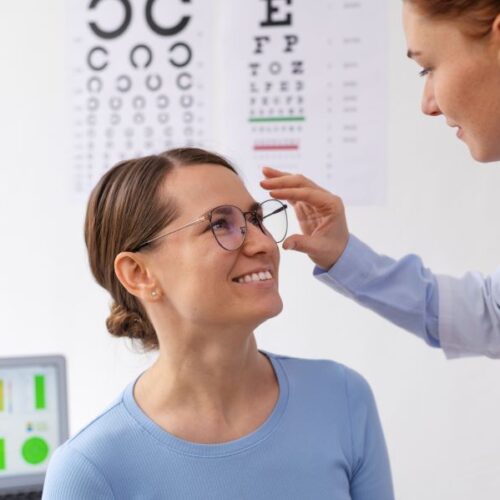Clarity is paramount when it comes to eye health. But cataracts, a common condition affecting millions worldwide, can cloud clear vision for some. The sudden improvement in your vision without your glasses could mean you need cataract surgery, but how do you know if you need cataract surgery?
Over time, cataracts can stealthily encroach upon our vision, blurring it and dimming it. You need to know the details of cataract symptoms, from the slightest shift in visual clarity to the more pronounced glare sensitivity.
Let’s explore how do you know if you need cataract surgery and why can I suddenly see better without my glasses.
What is a cataract?
Cataracts are eye conditions characterized by clouding of the eye’s natural lens, resulting in blurred or impaired vision. The clouding usually occurs slowly over time and can affect either or both eyes. Cataracts are often caused by aging, but they can also be caused by genetics, prolonged sun exposure, or certain medical conditions.
Recognizing the symptoms of cataracts is essential in understanding how do you know if you need cataract surgery. It may cause blurry or dim vision, increased sensitivity to glare, difficulty seeing at night, or seeing halos around lights.
Fortunately, cataract surgery offers a solution for restoring vision by removing the cloudy lens and replacing it with a clear artificial lens, fine-tuning vision after cataract surgery to improve clarity and quality of life.
Cataract Symptoms
So, vision with cataracts what does it look like? Identifying cataract symptoms can help answer this question and may enable early intervention and treatment. Symptoms vary depending on the type and severity of cataracts, but there are a few common ones.
- Blurry Vision: The first sign of cataracts is the gradual blurring of vision. The blurriness may resemble looking through a foggy or cloudy window.
- Increased Sensitivity to Glare: Cataracts can make you more sensitive to bright lights, like sunlight or headlights. Glare can cause discomfort and difficulty seeing clearly.
- Difficulty Seeing at Night: Cataracts can impair night vision, making it difficult to see in low light. As a result, you may need help navigating dimly lit spaces or driving at night.
- Halos Around Lights: Halos around lights, especially at night, are another common symptom. These halos may interfere with visual clarity and perception.
- Colors Appearing Faded or Yellowed: Cataracts can alter color perception, making colors appear faded or yellowed. It can affect the vibrancy and richness of the visual experience.
If you’ve ever wondered, “Why can I suddenly see better without my glasses?” it could be due to cataracts affecting your vision. Understanding these symptoms is essential to understanding “how do you know if you need cataract surgery.”
Fine-tuning vision after cataract surgery can alleviate these symptoms and improve your overall quality of life. For a comprehensive eye evaluation and personalized treatment plan, consult with an eye care professional.
Causes of Cataracts
Identifying the underlying causes of cataracts is vital in treating ****and preventing the disease. The primary risk factor for cataracts is aging; however, several other factors can play a role:
- Aging: The most common cause of cataracts is aging. We may develop cloudiness and opacity in our eyes as we age due to protein clumping in the lens.
- Ultraviolet (UV) Radiation: Long-term exposure to UV radiation from sunlight increases cataract risk. Using sunglasses and hats with brims can protect your eyes from harmful UV rays.
- Smoking: Smoking exposes the eyes to oxidative stress and harmful chemicals that can accelerate cataract development.
- Medical Conditions: Diabetes and hypertension can increase the risk of cataract development. Over time, high blood sugar levels and systemic inflammation can damage lenses.
- Genetics: Genetic predisposition can contribute to cataract development. Families with a history of cataracts may be more likely to develop the condition themselves.
- Trauma or Injury: Trauma to the eye, such as blunt force trauma or penetrating injuries, can damage the lens and increase cataract risk.
- Certain Medications: Chronic use of corticosteroids or other medications, such as cortisone, can result in cataracts.
Individuals can reduce their cataract risk by understanding these potential causes. Maintaining a healthy lifestyle, protecting the eyes from UV rays, and managing underlying medical conditions can help prevent cataracts.
“Vision with cataracts what does it look like?” can be significantly impaired, often as blurry or cloudy vision or as faded or yellowed colors.
Consult an eye care professional if you’re experiencing symptoms of cataracts or have concerns about your eye health. The professional eye care practitioner can answer your question, “How do you know if you need cataract surgery?”.
sunglasses for after cataract surgery, good sunglasses for eye protection
Vision with Cataracts What Does It Look Like?
Wondering vision with cataracts what does it look like? When you have cataracts, your vision is blurred or cloudy, as if you were looking through a foggy window. The colors may look faded or yellowed, and contrast sensitivity may be reduced, making it hard to tell shades apart and perceive depth.
Especially in bright sunlight or at night, glare sensitivity can be uncomfortable and make it hard to see. You may also see haloes around lights, which makes it harder to see. Consult an eye care professional if you experience these symptoms for an evaluation and treatment options.
How Do You Know If You Need Cataract Surgery
So, how do you know if you need cataract surgery? Assessing symptoms and their impact on daily life is necessary for determining whether cataract surgery is essential. Symptoms of vision loss include:
- Difficulty reading or driving.
- Sensitivity to glare.
- Difficulty performing routine tasks.
- Diminished quality of life.
It’s essential to see an eye care professional for a personalized evaluation and recommendations. If symptoms interfere with daily activities or lifestyle, cataract surgery may be recommended for fine-tuning vision after cataract surgery.
Why Can I Suddenly See Better Without My Glasses?
출처: Freepik
Are you wondering why can I suddenly see better without my glasses? Several factors can lead to improved vision without glasses. Among the most common causes are changes in eye health, such as fluctuations in refractive error or temporary improvements in visual acuity. Furthermore, environmental factors like lighting and eye fatigue can affect perception as well.
The production of tears or the lubrication of the eye may enhance clarity sometimes. It’s essential to see an eye doctor if this change persists because it could indicate underlying issues like cataracts. A regular eye exam ensures optimal eye health and monitors changes in vision.
Now let’s see if you have cataracts; vision with cataracts what does it look like?
Cataract Surgery Treatment Methods
출처: Freepik
In recent years, cataract surgery has evolved significantly, offering various treatment options. The following are three cataract surgery treatments:
- Custom Presbyopic Cataracts: This advanced procedure corrects both cataracts and presbyopia, a condition that affects near vision as we age. With multifocal or accommodating intraocular lenses (IOLs), custom presbyopic cataract surgery restores vision at multiple distances, reducing or eliminating the need for glasses.
- Laser Cataract Surgery: Compared to traditional cataract surgery, laser cataract surgery offers greater precision and customization. The laser assists in creating precise incisions, fragmenting the cataract for easier removal, and correcting astigmatism with greater accuracy.
- Micro-incision Cataract Surgery: Also known as microphacoemulsification, this minimally invasive cataract surgery makes a tiny incision that typically measures less than 1.8 millimeters in diameter. Compared to traditional cataract surgery, micro-incision cataract surgery reduces trauma to the eye and speeds up recovery.
All of these treatments have benefits and considerations, so the choice depends on your vision needs, the severity of your cataract, and your surgeon’s expertise. Fine-tuning vision after cataract surgery involves lens selection and post-operative care, ensuring optimal visual outcomes for the patient’s lifestyle and preferences.
Reliable Consultation for Cataracts at GS Ophthalmology
At GS Ophthalmology, we offer highly specialized cataract consultation services. We have experienced Korean doctors who specialize in cataract eye surgery and provide patients with complete care tailored to their needs.
We will thoroughly assess your eye health and visual symptoms related to cataracts during your consultation at GS Ophthalmology. In case you have questions like why I suddenly see better without glasses, we will answer them for you.
Using advanced diagnostics and state-of-the-art equipment, our Korean doctors can determine the most appropriate treatment for your cataracts.
Our Korean doctors will help you make informed decisions about your eye care, whether you need custom presbyopic cataract surgery, laser cataract surgery, or micro-incision cataract surgery.
Our commitment to excellence ensures you get a detailed consultation and a personalized treatment plan to address your cataract concerns. Get a consultation with our Korean doctors today and get a clearer vision and better eye health.
The Takeaway
Having an understanding of cataracts and their treatment options is crucial to maintaining your eye health and vision. The Korean doctors at GS Ophthalmology can provide invaluable insight if you are experiencing symptoms such as blurry vision or glare sensitivity.
Advancements in cataract surgery techniques like micro-incision cataract surgery and custom presbyopic cataracts have made restoring clarity to vision more achievable than ever.
What is Cataracts and how to treat Cataracts?
The Cataracts occurs when the natural lens at the back of the iris and pupil becomes cloudy. The most effective way to treat cataracts is to under go cataract surgery to restore vision by removing and replacing the cataract-affected lens with an artificial one.
What is 2-Day Lasek?
2-Day Lasek is a revolutionary laser eye surgery technique developed to boost your vision with minimal discomfort and a quick recovery.
How much does eye surgery in Korea cost?
According to the Medical Tourism site's chart, Korea ranked second as the best destination for laser eye surgery because of its advanced technology and affordable price. The total cost for both eye surgeries in Korea is lower than that in other countries. Don't hesitate to contact GS Eye Clinic via our KakaoTalk Channel for more information about the total price of eye surgery in Korea.
GS Ophthalmology Center
Directions 8,15,16F, Mizin Plaza, 390 Gangnam-daero, Gangnam-gu, Seoul, Korea











